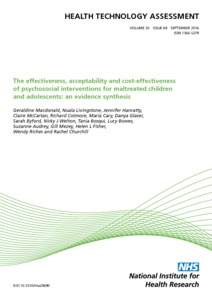Macdonald, G;
Livingstone, N;
Hanratty, J;
McCartan, C;
Cotmore, R;
Cary, M;
Glaser, D;
Byford, S;
Welton, NJ;
Bosqui, T;
et al.
Macdonald, G; Livingstone, N; Hanratty, J; McCartan, C; Cotmore, R; Cary, M; Glaser, D; Byford, S; Welton, NJ; Bosqui, T; Bowes, L; Audrey, S; Mezey, G; Fisher, HL; Riches, W; Churchill, R
(2016)
The effectiveness, acceptability and cost-effectiveness of psychosocial interventions for maltreated children and adolescents: an evidence synthesis.
Health Technol Assess, 20 (69).
pp. 1-508.
ISSN 2046-4924
https://doi.org/10.3310/hta20690
SGUL Authors: Mezey, Gillian Clare
![[img]](https://openaccess.sgul.ac.uk/111924/1.hassmallThumbnailVersion/3003450.pdf)  Preview |
|
PDF
Published Version
Available under License ["licenses_description_publisher" not defined].
Download (4MB)
| Preview
|
Abstract
BACKGROUND: Child maltreatment is a substantial social problem that affects large numbers of children and young people in the UK, resulting in a range of significant short- and long-term psychosocial problems. OBJECTIVES: To synthesise evidence of the effectiveness, cost-effectiveness and acceptability of interventions addressing the adverse consequences of child maltreatment. STUDY DESIGN: For effectiveness, we included any controlled study. Other study designs were considered for economic decision modelling. For acceptability, we included any study that asked participants for their views. PARTICIPANTS: Children and young people up to 24 years 11 months, who had experienced maltreatment before the age of 17 years 11 months. INTERVENTIONS: Any psychosocial intervention provided in any setting aiming to address the consequences of maltreatment. MAIN OUTCOME MEASURES: Psychological distress [particularly post-traumatic stress disorder (PTSD), depression and anxiety, and self-harm], behaviour, social functioning, quality of life and acceptability. METHODS: Young Persons and Professional Advisory Groups guided the project, which was conducted in accordance with Cochrane Collaboration and NHS Centre for Reviews and Dissemination guidance. Departures from the published protocol were recorded and explained. Meta-analyses and cost-effectiveness analyses of available data were undertaken where possible. RESULTS: We identified 198 effectiveness studies (including 62 randomised trials); six economic evaluations (five using trial data and one decision-analytic model); and 73 studies investigating treatment acceptability. Pooled data on cognitive-behavioural therapy (CBT) for sexual abuse suggested post-treatment reductions in PTSD [standardised mean difference (SMD) -0.44 (95% CI -4.43 to -1.53)], depression [mean difference -2.83 (95% CI -4.53 to -1.13)] and anxiety [SMD -0.23 (95% CI -0.03 to -0.42)]. No differences were observed for post-treatment sexualised behaviour, externalising behaviour, behaviour management skills of parents, or parental support to the child. Findings from attachment-focused interventions suggested improvements in secure attachment [odds ratio 0.14 (95% CI 0.03 to 0.70)] and reductions in disorganised behaviour [SMD 0.23 (95% CI 0.13 to 0.42)], but no differences in avoidant attachment or externalising behaviour. Few studies addressed the role of caregivers, or the impact of the therapist-child relationship. Economic evaluations suffered methodological limitations and provided conflicting results. As a result, decision-analytic modelling was not possible, but cost-effectiveness analysis using effectiveness data from meta-analyses was undertaken for the most promising intervention: CBT for sexual abuse. Analyses of the cost-effectiveness of CBT were limited by the lack of cost data beyond the cost of CBT itself. CONCLUSIONS: It is not possible to draw firm conclusions about which interventions are effective for children with different maltreatment profiles, which are of no benefit or are harmful, and which factors encourage people to seek therapy, accept the offer of therapy and actively engage with therapy. Little is known about the cost-effectiveness of alternative interventions. LIMITATIONS: Studies were largely conducted outside the UK. The heterogeneity of outcomes and measures seriously impacted on the ability to conduct meta-analyses. FUTURE WORK: Studies are needed that assess the effectiveness of interventions within a UK context, which address the wider effects of maltreatment, as well as specific clinical outcomes. STUDY REGISTRATION: This study is registered as PROSPERO CRD42013003889. FUNDING: The National Institute for Health Research Health Technology Assessment programme.
| Item Type: |
Article
|
| Additional Information: |
© Queen’s Printer and Controller of HMSO 2016. This work was produced by Macdonald et al. under the terms of a commissioning contract issued by the Secretary of State for Health. This issue may be freely reproduced for the purposes of private research and study and extracts (or indeed, the full report) may be included in professional journals provided that suitable acknowledgement is made and the reproduction is not associated with any form of advertising. Applications for commercial reproduction should be addressed to: NIHR Journals Library, National Institute for Health Research, Evaluation, Trials and Studies Coordinating Centre, Alpha House, University of Southampton Science Park, Southampton SO16 7NS, UK. |
| Keywords: |
Adolescent, Antipsychotic Agents, Anxiety Disorders, Child, Child Abuse, Child, Preschool, Clinical Trials as Topic, Cost-Benefit Analysis, Depression, Female, Humans, Infant, Infant, Newborn, Male, Mental Disorders, Models, Econometric, Models, Psychological, Object Attachment, Psychotherapy, Quality of Life, Resilience, Psychological, Self-Injurious Behavior, Stress Disorders, Post-Traumatic, Stress, Psychological, Substance-Related Disorders, United Kingdom, Young Adult, Humans, Substance-Related Disorders, Antipsychotic Agents, Models, Econometric, Depression, Self-Injurious Behavior, Stress, Psychological, Object Attachment, Mental Disorders, Anxiety Disorders, Stress Disorders, Post-Traumatic, Psychotherapy, Models, Psychological, Child Abuse, Quality of Life, Adolescent, Child, Child, Preschool, Infant, Infant, Newborn, Cost-Benefit Analysis, Female, Male, Clinical Trials as Topic, Resilience, Psychological, Young Adult, United Kingdom, 1117 Public Health and Health Services, 0807 Library and Information Studies, 0806 Information Systems, Health Policy & Services |
| SGUL Research Institute / Research Centre: |
Academic Structure > Population Health Research Institute (INPH) |
| Journal or Publication Title: |
Health Technol Assess |
| ISSN: |
2046-4924 |
| Language: |
eng |
| Dates: |
| Date | Event |
|---|
| September 2016 | Published |
|
| Publisher License: |
Publisher's own licence |
| Projects: |
|
| PubMed ID: |
27678342 |
| Web of Science ID: |
WOS:000385418500001 |
 |
Go to PubMed abstract |
| URI: |
https://openaccess.sgul.ac.uk/id/eprint/111924 |
| Publisher's version: |
https://doi.org/10.3310/hta20690 |
Statistics
Item downloaded times since 04 May 2020.
Actions (login required)
 |
Edit Item |



